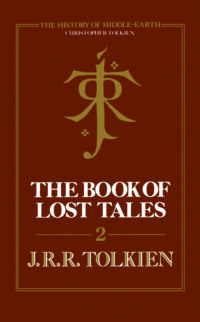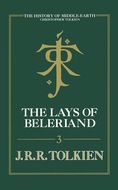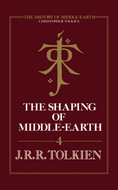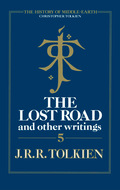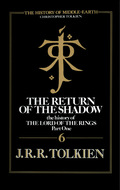Kitap dosya olarak indirilemez ancak uygulamamız üzerinden veya online olarak web sitemizden okunabilir.
Kitabı oku: «The Book of Lost Tales 2»

J.R.R. Tolkien
The Book of Lost Tales
Part II
Christopher Tolkien


Copyright
HarperCollinsPublishers Ltd
1 London Bridge Street
London SE1 9GF
This edition published by HarperCollinsPublishers 2010
First published by George Allen & Unwin 1984
 ® and ‘Tolkien’® are registered trade marks of The J.R.R. Tolkien Estate Limited
® and ‘Tolkien’® are registered trade marks of The J.R.R. Tolkien Estate Limited
THE BOOK OF LOST TALES, PART II. Copyright © The J.R.R. Tolkien Copyright Trust and C.R. Tolkien 1984. All rights reserved under International and Pan-American Copyright Conventions. By payment of the required fees, you have been granted the non-exclusive, non-transferable right to access and read the text of this e-book on-screen. No part of this text may be reproduced, transmitted, down-loaded, decompiled, reverse engineered, or stored in or introduced into any information storage and retrieval system, in any form or by any means, whether electronic or mechanical, now known or hereinafter invented, without the express written permission of HarperCollins e-books.
Source ISBN: 9780261102149
Ebook Edition © April 2010 ISBN: 9780007348190
Version: 2019-10-21
Contents
Cover
Title Page
Copyright
Preface
I The Tale of Tinúviel
Notes and Commentary
II Turambar and the Foalókë
Notes and Commentary
III The Fall of Gondolin
Notes and Commentary
IV The Nauglafring
Notes and Commentary
V The Tale of Eärendel
Notes and Commentary
VI The History of Eriol or Ælfwine and the End of the Tales
Ælfwine of England
Notes and Commentary
Appendix: Names in the Lost Tales—Part II
Short Glossary of Obsolete, Archaic, and Rare Words
Searchable Terms
About the Author
Other Books by J. R. R. Tolkien
About the Publisher
PREFACE
This second part of The Book of Lost Tales is arranged on the same lines and with the same intentions as the first part, as described in the Foreword to it, pages 10–11. References to the first part are given in the form ‘I. 240’, to the second as ‘p. 240’, except where a reference is made to both, e.g. ‘I. 222, II. 292’.
As before, I have adopted a consistent (if not necessarily ‘correct’) system of accentuation for names; and in the cases of Mim and Niniel, written thus throughout, I give Mîm and Níniel.
The two pages from the original manuscripts are reproduced with the permission of the Bodleian Library, Oxford, and I wish to express my thanks to the staff of the Department of Western Manuscripts at the Bodleian for their assistance. The correspondence of the original pages to the printed text in this book is as follows:
(1) The page from the manuscript of The Tale of Tinúviel. Upper part: printed text page 24 (7 lines up, the sorest dread) to page 25 (line 3, so swiftly.”). Lower part: printed text page 25 (11 lines up, the harsh voice) to page 26 (line 7, but Tevildo).
(2) The page from the manuscript of The Fall of Gondolin. Upper part: printed text page 189 (line 12, “Now,” therefore said Galdor to line 20 if no further.”). Lower part: printed text page 189 (line 27, But the others, led by one Legolas Greenleaf) to page 190 (line 11, leaving the main company to follow he).
For differences in the printed text of The Fall of Gondolin from the page reproduced see page 201, notes 34–36, and page 203, Bad Uthwen; some other small differences not referred to in the notes are also due to later changes made to the text B of the Tale (see pages 146–7).
These pages illustrate the complicated ‘jigsaw’ of the manuscripts of the Lost Tales described in the Foreword to Part I, page 10.
The third volume in this ‘History’ will contain the alliterative Lay of the Children of Húrin (c. 1918–1925) and the Lay of Leithian (1925–1931), together with the commentary on a part of the latter by C. S. Lewis, and the rewriting of the poem that my father embarked on after the completion of The Lord of the Rings.
I
THE TALE OF TINÚVIEL
The Tale of Tinúviel was written in 1917, but the earliest extant text is later, being a manuscript in ink over an erased original in pencil; and in fact my father’s rewriting of this tale seems to have been one of the last completed elements in the Lost Tales (see I. 203–4).
There is also a typescript version of the Tale of Tinúviel, later than the manuscript but belonging to the same ‘phase’ of the mythology: my father had the manuscript before him and changed the text as he went along. Significant differences between the two versions of the tale are given on pp. 41 ff.
In the manuscript the tale is headed: ‘Link to the Tale of Tinúviel, also the Tale of Tinúviel.’ The Link begins with the following passage:
‘Great was the power of Melko for ill,’ said Eriol, ‘if he could indeed destroy with his cunning the happiness and glory of the Gods and Elves, darkening the light of their dwelling and bringing all their love to naught. This must surely be the worst deed that ever he has done.’
‘Of a truth never has such evil again been done in Valinor,’ said Lindo, ‘but Melko’s hand has laboured at worse things in the world, and the seeds of his evil have waxen since to a great and terrible growth.’
‘Nay,’ said Eriol, ‘yet can my heart not think of other griefs, for sorrow at the destruction of those most fair Trees and the darkness of the world.’
This passage was struck out, and is not found in the typescript text, but it reappears in almost identical form at the end of The Flight of the Noldoli (I. 169). The reason for this was that my father decided that the Tale of the Sun and Moon, rather than Tinúviel, should follow The Darkening of Valinor and The Flight of the Noldoli (see I. 203–4, where the complex question of the re-ordering of the Tales at this point is discussed). The opening words of the next part of the Link, ‘Now in the days soon after the telling of this tale’, referred, when they were written, to the tale of The Darkening of Valinor and The Flight of the Noldoli; but it is never made plain to what tale they were to refer when Tinúviel had been removed from its earlier position.
The two versions of the Link are at first very close, but when Eriol speaks of his own past history they diverge. For the earlier part I give the typescript text alone, and when they diverge I give them both in succession. All discussion of this story of Eriol’s life is postponed to Chapter VI.
Now in the days soon after the telling of this tale, behold, winter approached the land of Tol Eressëa, for now had Eriol forgetful of his wandering mood abode some time in old Kortirion. Never in those months did he fare beyond the good tilth that lay without the grey walls of that town, but many a hall of the kindreds of the Inwir and the Teleri received him as their glad guest, and ever more skilled in the tongues of the Elves did he become, and more deep in knowledge of their customs, of their tales and songs.
Then was winter come sudden upon the Lonely Isle, and the lawns and gardens drew on a sparkling mantle of white snows; their fountains were still, and all their bare trees silent, and the far sun glinted pale amid the mist or splintered upon facets of long hanging ice. Still fared Eriol not away, but watched the cold moon from the frosty skies look down upon Mar Vanwa Tyaliéva, and when above the roofs the stars gleamed blue he would listen, yet no sound of the flutes of Timpinen heard he now; for the breath of summer is that sprite, and or ever autumn’s secret presence fills the air he takes his grey magic boat, and the swallows draw him far away.
Even so Eriol knew laughter and merriment and musics too, and song, in the dwellings of Kortirion—even Eriol the wanderer whose heart before had known no rest. Came now a grey day, and a wan afternoon, but within was firelight and good warmth and dancing and merry children’s noise, for Eriol was making a great play with the maids and boys in the Hall of Play Regained. There at length tired with their mirth they cast themselves down upon the rugs before the hearth, and a child among them, a little maid, said: ‘Tell me, O Eriol, a tale!’
‘What then shall I tell, O Vëannë?’ said he, and she, clambering upon his knee, said: ‘A tale of Men and of children in the Great Lands, or of thy home—and didst thou have a garden there such as we, where poppies grew and pansies like those that grow in my corner by the Arbour of the Thrushes?’
I give now the manuscript version of the remainder of the Link passage:
Then Eriol told her of his home that was in an old town of Men girt with a wall now crumbled and broken, and a river ran thereby over which a castle with a great tower hung. ‘A very high tower indeed,’ said he, ‘and the moon climbed high or ever he thrust his face above it.’ ‘Was it then as high as Ingil’s Tirin?’ said Vëannë, but Eriol said that that he could not guess, for ’twas very many years agone since he had seen that castle or its tower, for ‘O Vëannë,’ said he, ‘I lived there but a while, and not after I was grown to be a boy. My father came of a coastward folk, and the love of the sea that I had never seen was in my bones, and my father whetted my desire, for he told me tales that his father had told him before. Now my mother died in a cruel and hungry siege of that old town, and my father was slain in bitter fight about the walls, and in the end I Eriol escaped to the shoreland of the Western Sea, and mostly have lived upon the bosom of the waves or by its side since those far days.’
Now the children about were filled with sadness at the sorrows that fell on those dwellers in the Great Lands, and at the wars and death, and Vëannë clung to Eriol, saying: ‘O Melinon, go never to a war—or hast thou ever yet?’
‘Aye, often enough,’ said Eriol, ‘but not to the great wars of the earthly kings and mighty nations which are cruel and bitter, and many fair lands and lovely things and even women and sweet maids such as thou Vëannë Melinir are whelmed by them in ruin; yet gallant affrays have I seen wherein small bands of brave men do sometimes meet and swift blows are dealt. But behold, why speak we of these things, little one; wouldst not hear rather of my first ventures on the sea?’
Then was there much eagerness alight, and Eriol told them of his wanderings about the western havens, of the comrades he made and the ports he knew, of how he was wrecked upon far western islands until at last upon one lonely one he came on an ancient sailor who gave him shelter, and over a fire within his lonely cabin told him strange tales of things beyond the Western Seas, of the Magic Isles and that most lonely one that lay beyond. Long ago had he once sighted it shining afar off, and after had he sought it many a day in vain.
‘Ever after,’ said Eriol, ‘did I sail more curiously about the western isles seeking more stories of the kind, and thus it is indeed that after many great voyages I came myself by the blessing of the Gods to Tol Eressëa in the end—wherefore I now sit here talking to thee, Vëannë, till my words have run dry.’
Then nonetheless did a boy, Ausir, beg him to tell more of ships and the sea, but Eriol said: ‘Nay—still is there time ere Ilfiniol ring the gong for evening meat: come, one of you children, tell me a tale that you have heard!’ Then Vëannë sat up and clapped her hands, saying: ‘I will tell you the Tale of Tinúviel.’
The typescript version of this passage reads as follows:
Then Eriol told of his home of long ago, that was in an ancient town of Men girt with a wall now crumbled and broken, for the folk that dwelt there had long known days of rich and easy peace. A river ran thereby, o’er which a castle with a great tower hung. ‘There dwelt a mighty duke,’ said he, ‘and did he gaze from the topmost battlements never might he see the bounds of his wide domain, save where far to east the blue shapes of the great mountains lay—yet was that tower held the most lofty that stood in the lands of Men.’ ‘Was it as high as great Ingil’s Tirin?’ said Vëannë, but said Eriol: ‘A very high tower indeed was it, and the moon climbed far or ever he thrust his face above it, yet may I not now guess how high, O Vëannë, for ’tis many years agone since last I saw that castle or its steep tower. War fell suddenly on that town amid its slumbrous peace, nor were its crumbled walls able to withstand the onslaught of the wild men from the Mountains of the East. There perished my mother in that cruel and hungry siege, and my father was slain fighting bitterly about the walls in the last sack. In those far days was I not yet war-high, and a bondslave was I made.
‘Know then that my father was come of a coastward folk ere he wandered to that place, and the longing for the sea that I had never seen was in my bones; which often had my father whetted, telling me tales of the wide waters and recalling lore that he had learned of his father aforetime. Small need to tell of my travail thereafter in thraldom, for in the end I brake my bonds and got me to the shoreland of the Western Sea—and mostly have I lived upon the bosom of its waves or by its side since those old days.’
Now hearing of the sorrows that fell upon the dwellers in the Great Lands, the wars and death, the children were filled with sadness, and Vëannë clung to Eriol, saying: ‘O Melinon, go thou never to a war—or hast thou ever yet?’
‘Aye, often enough,’ said Eriol, ‘yet not to the great wars of the earthly kings and mighty nations, which are cruel and bitter, whelming in their ruin all the beauty both of the earth and of those fair things that men fashion with their hands in times of peace—nay, they spare not sweet women and tender maids, such as thou, Vëannë Melinir, for then are men drunk with wrath and the lust of blood, and Melko fares abroad. But gallant affrays have I seen wherein brave men did sometimes meet, and swift blows were dealt, and strength of body and of heart was proven—but, behold, why speak we of these things, little one? Wouldst not hear rather of my ventures on the sea?’
Then was there much eagerness alight, and Eriol told them of his first wanderings about the western havens, of the comrades he made, and the ports he knew; of how he was one time wrecked upon far western islands and there upon a lonely eyot found an ancient mariner who dwelt for ever solitary in a cabin on the shore, that he had fashioned of the timbers of his boat. ‘More wise was he,’ said Eriol, ‘in all matters of the sea than any other I have met, and much of wizardry was there in his lore. Strange things he told me of regions far beyond the Western Sea, of the Magic Isles and that most lonely one that lies behind. Once long ago, he said, he had sighted it glimmering afar off, and after had he sought it many a day in vain. Much lore he taught me of the hidden seas, and the dark and trackless waters, and without this never had I found this sweetest land, or this dear town or the Cottage of Lost Play—yet it was not without long and grievous search thereafter, and many a weary voyage, that I came myself by the blessing of the Gods to Tol Eressëa at the last—wherefore I now sit here talking to thee, Vëannë, till my words have run dry.’
